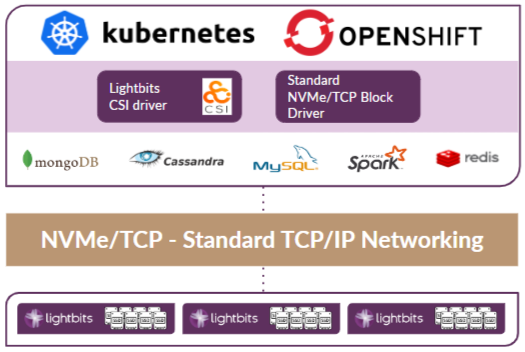Lack of Built-in Persistence
Containers are designed to be lightweight, portable, and stateless, which means that they typically do not have built-in mechanisms for persistent data storage. As a result, any data stored within a container is ephemeral and is lost when the container is shut down or restarted. This lack of built-in persistence can pose challenges for applications that require long-term data storage or stateful operations, such as databases. Without persistent storage, organizations may struggle to maintain data integrity, continuity of operations, and compliance with regulatory requirements.
Data Management Issues in Container Clusters
Applications are often deployed as microservices across multiple containers or pods within a cluster which can lead to data fragmentation, duplication, and inconsistency. Managing data across container clusters becomes increasingly complex as the number of containers and services grows, making it difficult to track data dependencies, ensure data consistency, and implement data governance policies. Architecting Kubernetes storage as a cluster with a unified management interface can help eliminate operational inefficiencies.
Performance Considerations
Containers are known for their efficiency and scalability, but they can also introduce performance overhead, especially when it comes to storage operations. Implement the wrong storage and your Kubernetes environment may experience latency, bottlenecks, and resource contention, leading to poor application performance and user experience. Storage performance considerations become even more critical in containerized environments with high-throughput or latency-sensitive workloads, such as real-time analytics or transaction processing. Persistent storage for Kubernetes from Lightbits delivers consistent high-performance, so that you can scale your applications effectively and meet your SLAs.
Persistent storage is essential for unlocking the full potential of Kubernetes, enabling organizations to run a wide range of workloads, including stateful applications, with confidence and efficiency. Many applications require persistent data storage to maintain their state across multiple instances, updates, failures, or restarts. Examples include databases, whereby persistent storage enables these stateful applications to be managed within container orchestration platforms like Kubernetes, allowing organizations to modernize their infrastructure without sacrificing functionality.
What is the Difference Between Persistent and Non-Persistent Storage?
Persistent storage retains data beyond the lifespan of the container itself ensuring that important information is not lost and can be accessed by applications as needed. While non-persistent storage loses data when the associated process or instance is shut down or terminated.
What is the Function of Persistent Storage?
Persistent storage for Kubernetes is essential for running stateful applications and enabling data persistence in containerized environments, allowing Kubernetes to support a broader range of workloads, including those with stringent data storage requirements.




